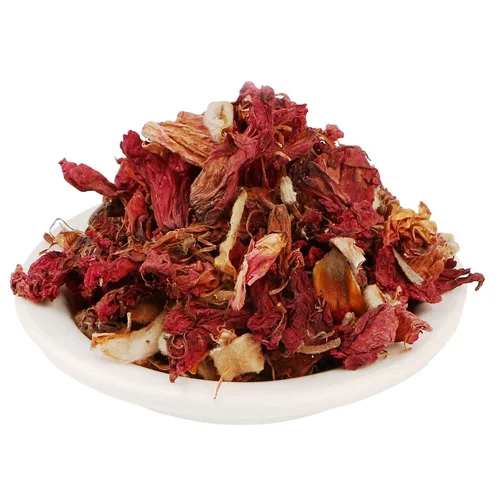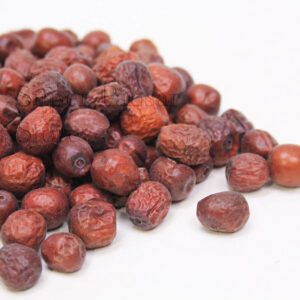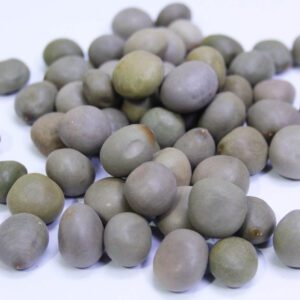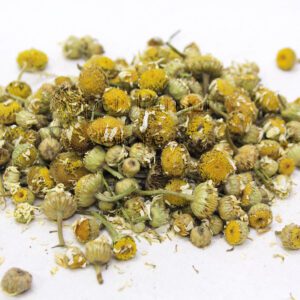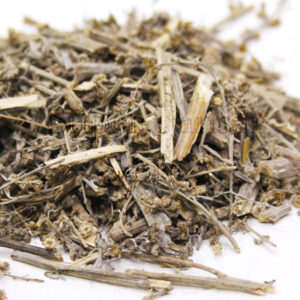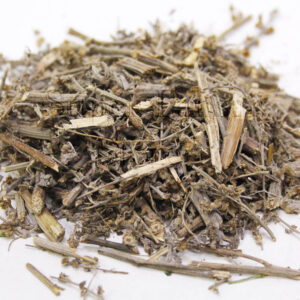No products in the cart.
Overview
Hibiscus is a genus of flowering plants that belongs to the family Malvaceae, which includes several hundred species.
The most commonly cultivated species is Hibiscus sabdariffa, also known as roselle or red sorrel.
Hibiscus plants are known for their large, showy flowers, which come in various colors, including shades of red, pink, yellow, and white.
The flowers typically have five petals and a prominent stamen. Hibiscus plants can be shrubs, trees, or herbaceous perennials, depending on the species.
Hibiscus flowers, particularly those of Hibiscus sabdariffa, are used in culinary applications around the world.
The dried calyces (the sepals of the flower) are commonly used to make hibiscus tea, a tart and refreshing beverage enjoyed both hot and cold.
Hibiscus flowers are also used to flavor jams, jellies, sauces, and desserts.
Benefits
Cardiovascular Health:
Hibiscus has been studied for its potential to support heart health. Research suggests that hibiscus tea may help lower blood pressure levels due to its diuretic properties and ability to relax blood vessels. Regular consumption of hibiscus tea may contribute to reduced risk factors for heart disease, such as hypertension and high cholesterol levels.
Antioxidant Activity:
Hibiscus contains various antioxidants, including flavonoids, anthocyanins, and vitamin C. These antioxidants help neutralize harmful free radicals in the body, reducing oxidative stress and inflammation. Antioxidants are important for overall health and may help protect against chronic diseases such as cancer, diabetes, and neurodegenerative disorders.
Blood Sugar Regulation:
Some studies suggest that hibiscus extract may have antidiabetic effects, helping to lower blood sugar levels and improve insulin sensitivity. Regular consumption of hibiscus tea or supplements may be beneficial for individuals with diabetes or those at risk of developing the condition.
Liver Health:
Hibiscus has hepatoprotective properties, meaning it may help protect the liver from damage caused by toxins and oxidative stress. By promoting liver health and detoxification processes, hibiscus may support overall well-being and reduce the risk of liver diseases.
Weight Management:
Hibiscus extract may aid in weight management by inhibiting the absorption of dietary fats and carbohydrates. Additionally, its diuretic properties may help reduce water retention and bloating, contributing to weight loss efforts.
Digestive Health:
Hibiscus tea is known for its digestive benefits, helping to soothe the digestive tract and relieve symptoms such as indigestion, bloating, and constipation. It may also support gastrointestinal health by promoting the growth of beneficial gut bacteria.
Skin Health:
Topical application of hibiscus extracts or oils may benefit the skin by promoting hydration, reducing inflammation, and protecting against UV damage. Hibiscus is often used in skincare products such as creams, lotions, and serums for its moisturizing and anti-aging properties.
Immune Support:
The vitamin C content of hibiscus contributes to its immune-boosting properties. Regular consumption of hibiscus tea or extracts may help strengthen the immune system and reduce the risk of infections.
Uses
Culinary Uses:
Tea: Hibiscus tea, made from dried hibiscus calyces, is a popular beverage enjoyed around the world. It has a tart, refreshing flavor and can be consumed hot or cold. Hibiscus tea is often sweetened with honey or sugar and may be flavored with additional ingredients like citrus fruits or spices.
Flavoring: Hibiscus flowers and calyces are used to flavor a variety of culinary dishes, including jams, jellies, syrups, sauces, and desserts. They add a tangy, floral note to recipes and can enhance the flavor of both sweet and savory dishes.
Ingredient in Beverages: Hibiscus is used as an ingredient in various beverages, including cocktails, smoothies, and herbal infusions. Its vibrant color and tart flavor make it a popular addition to mixed drinks and non-alcoholic beverages.
Medicinal Uses:
Blood Pressure Regulation: Hibiscus tea is traditionally used in herbal medicine to help lower blood pressure levels and improve cardiovascular health. It contains compounds that act as natural diuretics and vasodilators, helping to relax blood vessels and reduce hypertension.
Blood Sugar Control: Hibiscus may help regulate blood sugar levels and improve insulin sensitivity, making it potentially beneficial for individuals with diabetes or those at risk of developing the condition.
Digestive Health: Hibiscus tea is known for its digestive benefits, helping to soothe the digestive tract, alleviate indigestion, and promote healthy bowel movements. It may also support gastrointestinal health by promoting the growth of beneficial gut bacteria.
Liver Support: Hibiscus has hepatoprotective properties, meaning it may help protect the liver from damage caused by toxins and oxidative stress. Regular consumption of hibiscus tea or supplements may support liver health and detoxification processes.
Cosmetic Uses:
Skincare: Hibiscus extracts or oils are used in cosmetic products such as creams, lotions, and serums for their moisturizing, anti-inflammatory, and anti-aging properties. Hibiscus helps hydrate the skin, reduce inflammation, and improve skin elasticity, making it suitable for various skincare formulations.
Haircare: Hibiscus is also used in hair care products such as shampoos, conditioners, and hair oils. It helps nourish the scalp, strengthen hair follicles, and promote healthy hair growth. Hibiscus is particularly beneficial for dry or damaged hair, helping to restore shine and vitality.
Ornamental Uses:
Hibiscus plants are cultivated for their ornamental value and are commonly grown in gardens, landscapes, and indoor spaces. They produce large, colorful flowers that add beauty and visual interest to any setting. Hibiscus flowers attract pollinators such as bees, butterflies, and hummingbirds, making them a welcome addition to any garden.
Additional information
| Form | Whole (ثابت), Grounded (کٹی ہوئی), Powder (پسا ہوا) |
|---|---|
| Weight | 50 Grams, 100 Grams, 250 Grams, 500 Grams, 1000 Grams |

